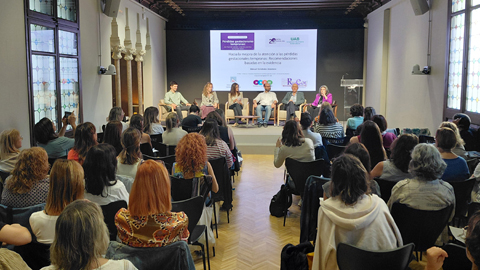Researchers and professionals call for greater awareness and visibility of spontaneous abortions
On Thursday 23 October the UAB's AFIN group organised a scientific conference in Barcelona with researchers and health professionals who discussed the results of their research, one of which is a document with recommendations to improve care for people who have suffered early pregnancy losses. They also presented the results of the first public opinion poll at state level on the issue, which reveals a huge lack of social awareness.

According to the poll the majority of the population (89%) considers it necessary that the healthcare system include information on miscarriages, a reality affecting 10% to 20% of pregnancies in Spain.
Pregnancy loss in the first trimester affects 10% to 20% of all pregnancies, with the majority occuring before the 12th week of gestation (85%) according to the Spanish Society of Gynaecology and Obstetrics. The conference on Pèrdues gestacionals prematures: derribant tabús, creant ponts i sumant veus [Premature Miscarriages: Breaking Taboos, Building Bridges and Joining Voices], organised by the UAB's AFIN group (Department of Social and Cultural Anthropology) with the support of the Spanish Ministry for Equality's Women's Institute and the "la Caixa" Foundation. The even took place on Thursday 23 October in Barcelona and brought together anthropologists, midwives, nurses, doctors, and psychologists, who highlighted the need for greater awareness and visibility of spontaneous abortion. This was stated by UAB lecturer and coordinator of the conference, Carolina Remorini, in her welcoming speech.
The research results were presented and discussed throughout the conference, such as a document with evidence-based recommendations on how to improve healthcare in the first trimester, entitled How can we improve healthcare for pregnancy losses in the first trimester? How can we improve healthcare for pregnancy losses in the first trimester?, prepared by the research groups AFIN-Universitat Autònoma de Barcelona, the POMADE-Universitat d’Alacant group, and the Hospital de Sant Pau i la Santa Creu. The report First trimester pregnancy losses: visibility, recognition and care. Executive summary. was also presented and discussed.
Among the main conclusions, researchers highlighted the lack of understanding and social and emotional recognition by those close to these women and the institutions. It is observed that the experience of suffering due to loss is not sufficiently recognised or legitimised, and a lack of a respectful attitude towards feelings or values is observed.
A lack of training among healthcare professionals was also noted, which makes it difficult to provide respectful care tailored to the needs of each person. Another point highlighted by the research results is the absence of specific protocols and the need for regulations that cover losses before 12 weeks.
According to Diana Marre, director of the AFIN group at the UAB, “we have detected that miscarriage is invisible, no one talks about it, and what's more, women feel guilty about it”. For this reason, the researcher believes that “it would be necessary to introduce important changes in healthcare and promote awareness among society of this reality affecting many women”. Cristina Trilla Solà, doctor at the Functional Unit for Reproductive Losses at the Hospital de la Santa Creu i Sant Pau, pointed out that “the way in which a miscarriage is communicated has a very big emotional impact and needs to be improved”.
Public opinion poll
As part of the conference, María José Rodríguez Jaume from the Universitat d'Alacant presented the Spanish opinion poll on pregnancy losses, "the first study with these characteristics conducted in Spain, with 1,857 people participating", she highlighted.
The results show that only one in four people (24.1%) is capable of identifying three scientifically based spontaneous abortion risk factors. Despite advances in medical information, 17.3% of the population still attributes spontaneous abortions to “bad luck” or “destiny” (5.9%), which reflects the persistence of believing that spontaneous abortions are inevitable.
The majority of the population (83.5%) recognises the emotional impact of loss, but 57.5% claim to have never talked about miscarriages. There is broad consensus regarding the need for information and awareness: 89% of the population believes that the healthcare system should include the possibility of experiencing a miscarriage in prenatal education programmes, and 76% believe that society is not sufficiently aware of this reality.
Research project
The documents presented are the result of the research project “Early reproductive losses: from invisible physical and emotional discomfort to possible personal, family and social grief”, funded by the “la Caixa” Foundation and led by Diana Marre (Universitat Autònoma de Barcelona), María José Rodríguez Jaume (Universitat d’Alacant), and Elisa Llurba Olivé (Santa Creu i Sant Pau Biomedical Research Institute), with the coordination of researcher and lecturer of Anthropology at the UAB, Carolina Remorini.
During the event, short audiovisual films were also screened that were made as part of the research. The exhibition “I have nothing more. Collective memory and materiality" was also on display. The exhibition includes images shared by people who have experienced losses, or by those who have accompanied them.